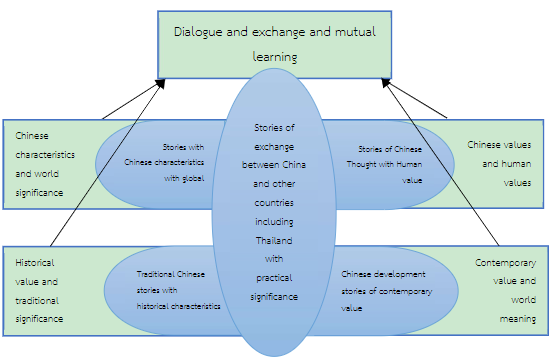Principles and Contents of " Narrating Chinese Stories Well" to Thai Chinese Learners
Main Article Content
บทคัดย่อ
"Narrating Chinese Stories Well" to Thai Chinese learners in Thailand is both a means and a goal. At present, there are still some problems with " Narrating Chinese Stories Well". According to the current situation of teaching Chinese to Thai learners, there are special principles that should be followed: historical value and traditional meaning, contemporary value and realistic meaning, Chinese characteristic and world meaning, Chinese value and human value, dialogue exchange and mutual appreciation. Under the general principle and the special principle, the "China Story" of Chinese language teaching for Chinese learners in Thailand includes Chinese traditional stories with historical characteristics, Chinese development stories with contemporary value, Chinese characteristic stories with world significance, Chinese thought stories with human value and Chinese communication story with real significance. On the basis of the above-mentioned principles and contents, the strategies of its teaching application can be determined from four aspects: Story-Based Teaching Setting, Socialized Teaching Practice, Experiential Cultural Guidance, and Interactive Negotiation and Communication.
Article Details

อนุญาตภายใต้เงื่อนไข Creative Commons Attribution-NonCommercial-NoDerivatives 4.0 International License.
เอกสารอ้างอิง
BAI, W. (2019). "China Model" and "China Story" from the Perspective of Civilization Communication. News and communication review, 72(06), 5-16.
CHENG, Q. (2016). Telling China's Story well and Innovating external Communication [J]. People's Forum, (19), 113-115.
FEI, X. (1990). The Absence of dialogue -- the study of people in China -- personal experience. Reading, (10), 3-11.
GUO, H. (2019). Telling the Chinese Story well and Constructing the Discourse power of Marxism in China. Journal of Jishou University, 40(S1), 9-11.
Hanban/Confucius Institute Headquarters. (2014). General Syllabus for International Chinese Language Teaching (Revised edition). Beijing: Foreign Language Teaching and Research Press.
LI, D. (2014). Universal Values and China's Story. Leadership Review, (14), 28-33.
LIANG, F. (2019). On universal value from Chinese Traditional Cultural Values. Economic Research Guide, (34), 187-188.
WANG, S., & CAO, W. (2019). Telling the Chinese story well: A study on the international communication strategy of Chinese culture. Journal of Sichuan Socialist College, (02), 30-35.
XI, J. (2015). Working together to build a new partnership of win-win cooperation, Concentric build human destiny community - speech at the seventieth session of the UN general assembly general debate. A/OL, 29-09: http://www.xinhuanet.com/world/2015-09/29/c_1116703645.htm.
XI, J. (2016). Xi jinping in the party's news public opinion work symposium speech. A/OL, 19-02: http://news.12371.cn/2016/02/19/ARTI1455884864721881.shtml.
XI, J. (2021). Reply to overseas students at Peking University. A/OL, 22-06: http://www.xinhuanet.com/politics/leaders/2021-06/22/c_1127586707.htm.
XI, J. (2019). Deepen Exchanges and Mutual Learning among Civilizations to Build an Asian Community with a Shared Future -- Keynote Speech at the Opening Ceremony of the Conference on Dialogue of Asian Civilizations. A/OL:15-05: http://www.xinhuanet.com/world/2019-05/15/c_1210134568.htm.
XI, J. (2014). A language is to master the key which lead to A country's culture. A/OL, 30-03: http://cpc.people.com.cn/n/2014/0330/c64094-24773105.html.
XIAO, L. (2009). China Overview Course. Beijing: Peking University Press.
YU, J. (2020). Telling Good Chinese Stories and Presenting Wonderful China -- A Case study of People's Daily's Report on ciIE. Audio-visual, (6), 169-171.
ZHANG, X. (2019). Telling Chinese stories to live up to the mission of The Times. News research guide, 10(12), 229-230+234.


